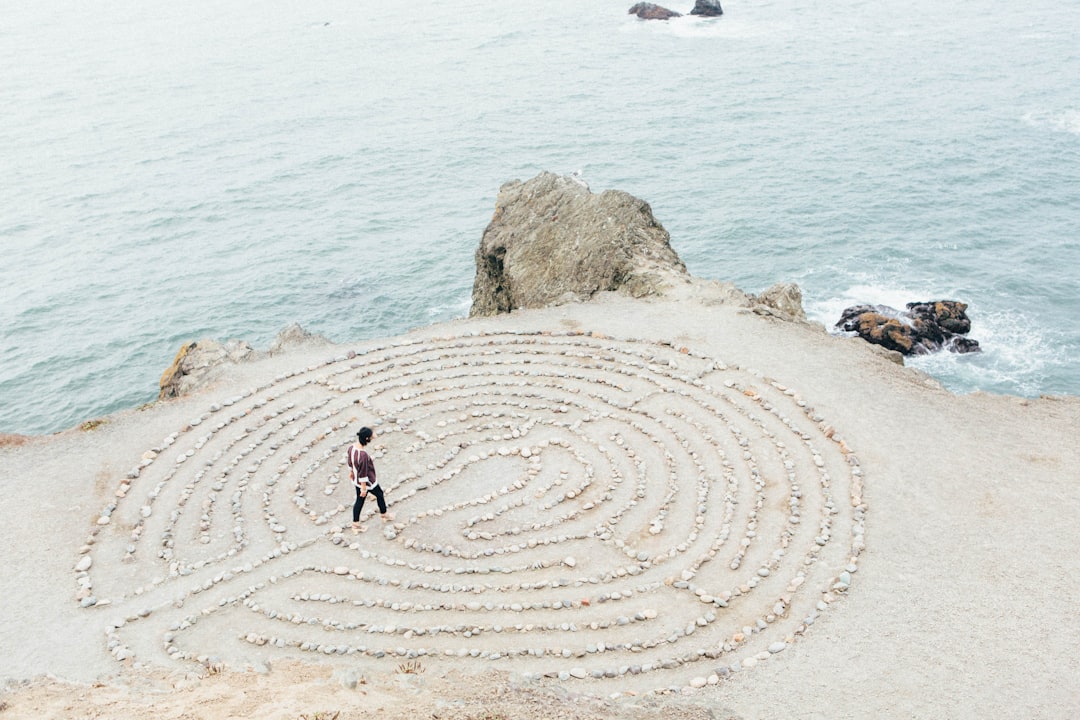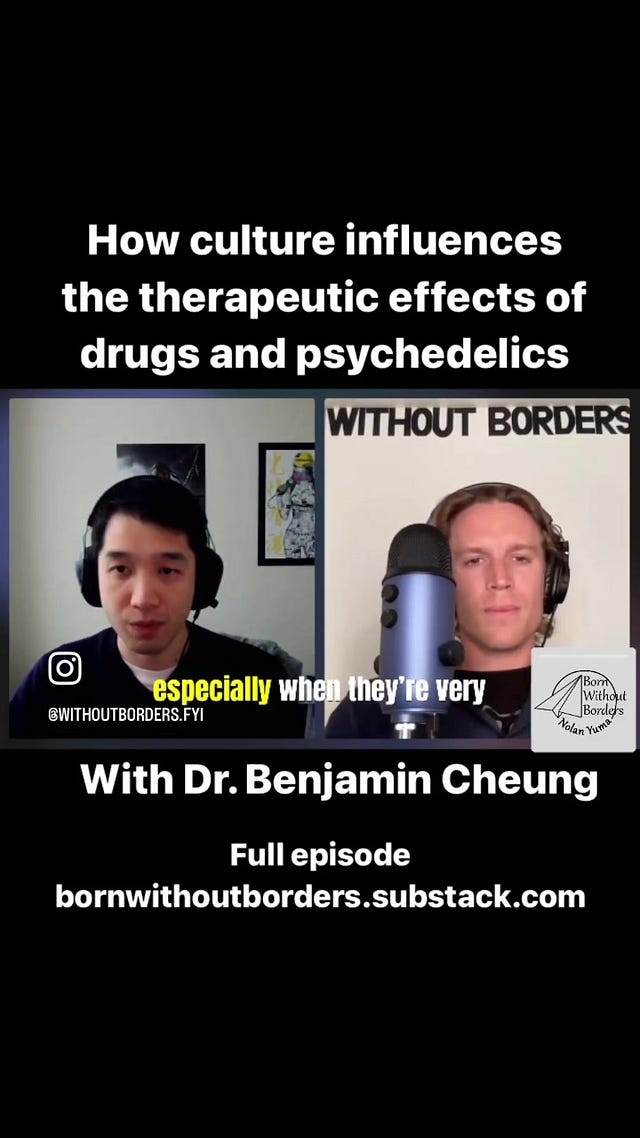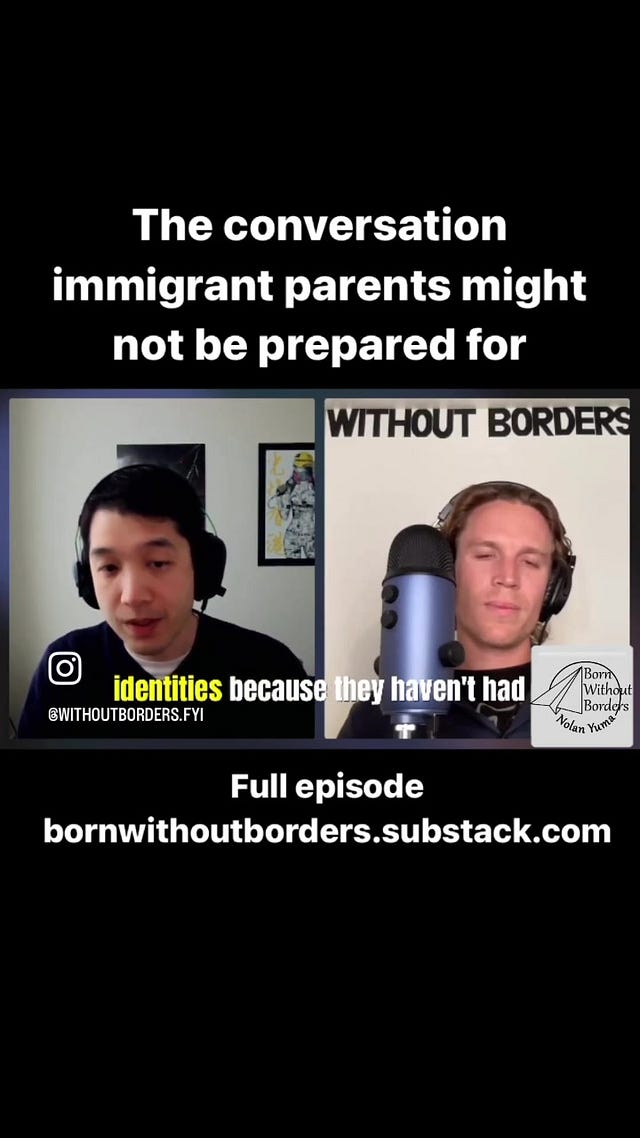Is There an Authentic Self?
Identity, psychedelics, genetic essentialism, and sleep culture with Dr. Benjamin Cheung

During season one of the Born Without Borders podcast, I spoke with Dr. Benjamin Cheung, a leading expert in the fields of genetic essentialism, culture and sleep, and acculturation. Benjamin shared his cultural experience as a 1.5-generation Chinese Canadian and how parents of immigrant children can ease the acculturation process. We also spoke about the authentic self and how culture affects the outcomes of drug use, psychedelics, the 4-hour workweek, and even how much sleep you need.
Full Episode
Conversation Highlights
Nolan: How would you define the authentic self? Because that's where people get into a discussion. It's like, if you're changing and adapting, you're not being authentic. And that’s what Carl Rodgers would emphasize, right? The importance of having this stable core self that stays the same from place to place.
And then you had Gergen and the postmodern writers who emphasized the importance of having these different identities. So, what to you is the authentic self?
Ben: So, I don't believe that there is like one single authentic self that is stable with you for the entirety of your life. I think for some people, that's certainly the case. And so it's easy to talk about that as being the authentic self, especially for people who really only grow up in one place and only know that environment and so have developed an identity that works for them in that environment.
So, that's easy to say that that's your authentic self. I know people don't generally change drastically. People might add on things to their identities, or there might be slight shifts in their identities over time as they get older. Like, you'll have people who might have been very congenial when they were a little younger or very patient, but as they get older, they don't want to take shit from people anymore. And they become a little more cantankerous.
It doesn't mean that they're no longer authentic. They are authentic because that's just how they've come to develop over time because of maybe changes in their circumstance or changes in how they're processing their philosophy in life.
So, there might be this idea of an authentic self. I don't believe that that has to be this perpetually stable constellation of things that never changes.
Nolan: I agree. And I don't even think it's possible in many cases.
Ben: Yeah, yeah. I agree.
Nolan: And what about ego death? Like this complete loss of subjective self-identity? People talk about that, and I'm wondering what you think about it because sometimes I relate this feeling of ego death to some indigenous writers when they talk about some of these mystical experiences. I’ll get into it more later, but what do you think about this idea of ego death? Is this something that people should strive towards?
Ben: I’m less familiar with ego death. Can you talk a bit more about it?
Nolan: It relates to the complete loss of subjective self-identity—this feeling where you don't feel separate from anything else, possibly. You’re just so in the moment that you don't have any judgments about others in that moment—you might not have any judgments about yourself. I might be wrong about this, but that’s how I understand it.
Ben: Okay, that sounds to me like someone who is on psychedelics.
Nolan: That was gonna be my connection a little later, actually, haha.
Ben: Yeah. It sounds a little like someone on psychedelics. I don't think that's a bad thing.

 Tiktok failed to load.
Tiktok failed to load.Enable 3rd party cookies or use another browser
Ben: I think there's a net benefit to using these kinds of substances, right? As long as there's a good culture that surrounds the use of that substance.
When there isn't, and there is huge criminalization of that kind of behaviour and huge stigma associated with that kind of behavior, then it becomes a net negative because then you have people who are being stigmatized as people who use these substances. You have people who are being pushed into the peripheries of society for using these substances.
Especially when you have people who are using it, you know, specifically to try to cope with mental illnesses. And there isn't enough support for people who are dealing with those kinds of issues, especially when they're very severe. So, there's not enough social resources for them, and there's being stigmatized and they're being criminalized for doing this.

 Tiktok failed to load.
Tiktok failed to load.Enable 3rd party cookies or use another browser
Nolan: I know varies quite a bit but what are some of the tools that you could bring up right now for this adaptation period? On this show, I always begin it by saying it’s for immigrants, refugees, expats, or anyone else that feels inescapably foreign because sometimes people who haven't lived in a different country, but their parents come from a different country and have a completely different value system. They also have to tackle this ‘feeling foreign’ in a way.
Ben: You know, it's really hard to do this. It's really hard to enact any of these things when you're in the adjustment period, because that adjustment period is oftentimes when people are quite a bit younger like early teens, mid-teens, kind of period.
Well really anytime from birth to like mid-teens is when people are most sensitive to their cultural environment. And so, it's kind of hard, you know, for us to say, well, kids should be doing this to maximally adjust. I think kids will just naturally absorb what is in their environment.
What becomes a bigger issue is how parents are handling that process. And I think the parents are oftentimes a primary factor for how successfully the children are able to navigate that difficult period in their lives as well as a difficult cultural situation for them.
And I say that because I think oftentimes—and especially immigrant parents—aren't prepared to have these kinds of conversations with their children about cultural disparities and cultural conflicts and having different cultural identities because they haven't had to deal with that themselves, right?
And so how do you have that conversation about something that you yourself haven't had experience or you yourself might not understand?
Season one of the Podcast Without Borders: Stories by the Inescapably Foreign lasted from October 2022 to June 2023. My goal was to share people’s stories to see beyond the constructed boundaries of borders and expand cultural sensibilities.
I was also pissed off with bureaucrats. I hoped that by sharing people’s struggles, we could pressure government bodies to make their immigration systems less archaic, racist, and slug-like.
As much as I loved interviewing people from around the world, I no longer had the financial savings to continue the project and had to focus more on teaching hours. However, the Substack community gives me hope for season two.



Oh I’m keen to listen to this!
I wonder how much of this sense of the authentic self as an individual versus collective understanding is correlated with consumerism in the digital age. So much of what we're sold is about "being more ME ME ME" (what does your toothbrush say about who you are? what about your Netflix algorithm? how about fermented cheese?) when to your point about psychedelics, a deeper sense of self often accompanies a "self-less" experience (flow states)